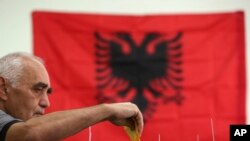Albanians are heading to the polls amid high tensions between the ruling and opposition parties and a tug-of-war between the country’s prime minister and the president.
The main opposition parties are boycotting the June 30 municipal elections, accusing the Socialist-led government of Prime Minister Edi Rama of previous electoral fraud and corruption.
Rama and his government have denied the allegations and insisted on holding the vote, even after President Ilir Meta said he was postponing it until October amid security concerns.
Opposition supporters have protested for weeks, calling for Rama's resignation and new general elections, and clashed with police in several incidents where they tried to disrupt election preparations.
Some 3.5 million Albanians are eligible to elect mayors and town hall councils in 61 districts. The total registered voter list is larger than the country's population of 2.9 million because of the number of people from the Albanian diaspora in other countries.
Voting began at 7 a.m. local time, but is not clear whether all the voting centers will operate normally. Preliminary results are expected on July 1.
Around 12 percent of eligible voters had cast their ballots by 11 a.m., according to the election authorities.
Interior Minister Sander Lleshaj said that voting was proceeding calmly.
The elections are seen as a test of the small Balkan nation's democratic development and will be closely observed by the European Union as the bloc looks to evaluate Albania's credentials for potential membership.
The Organization for Security and Cooperation in Europe is sending observers to monitor the vote.
"Any attempt to derail the democratic process through violent action stalls the progress of Albania and stains the country's international reputation," it said.
Rama, in power since 2013, cast his ballot in the village of Surrel, where he told journalists, "This day confirms that no one can play with the people...and who dares take sovereignty from the people finds no other end but a failing and a shameful one."
He told RFE/RL on June 21 that Meta's decision to cancel voting was an "individual act" that was "absolutely a nonbinding decision" and unconstitutional.




